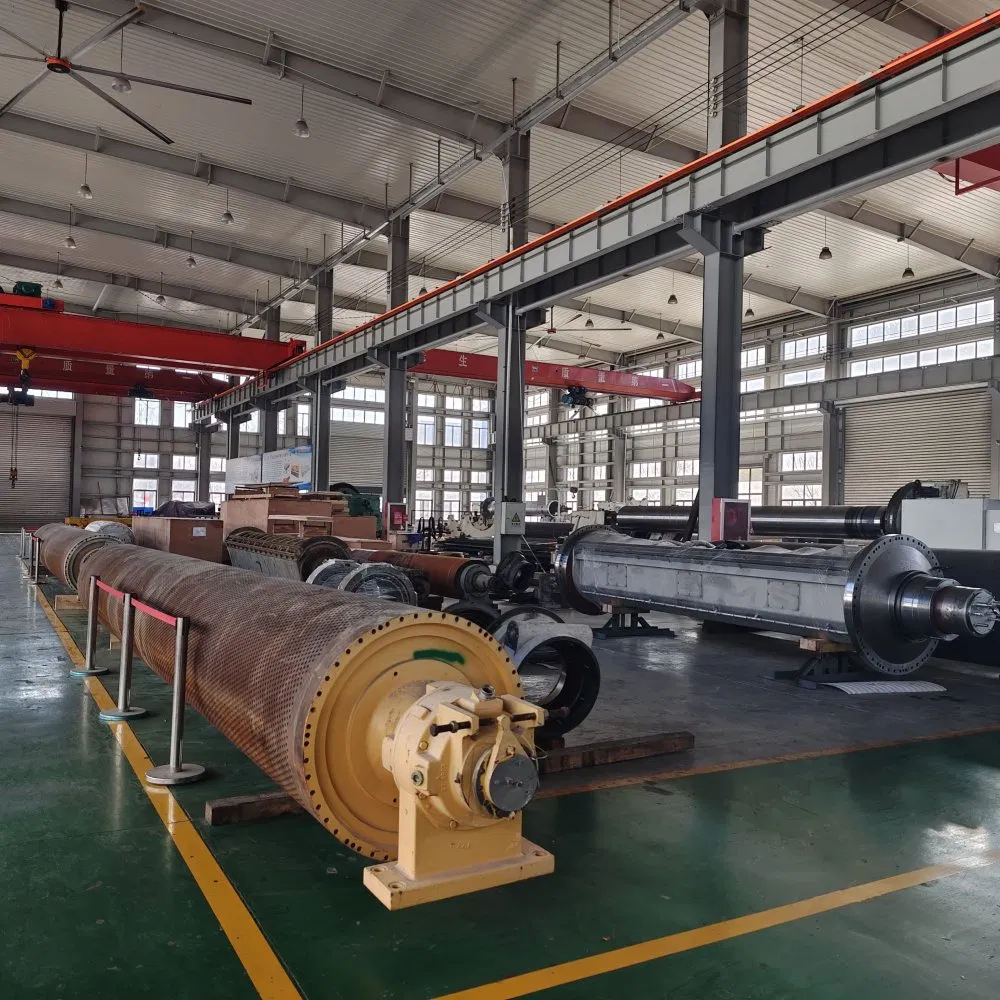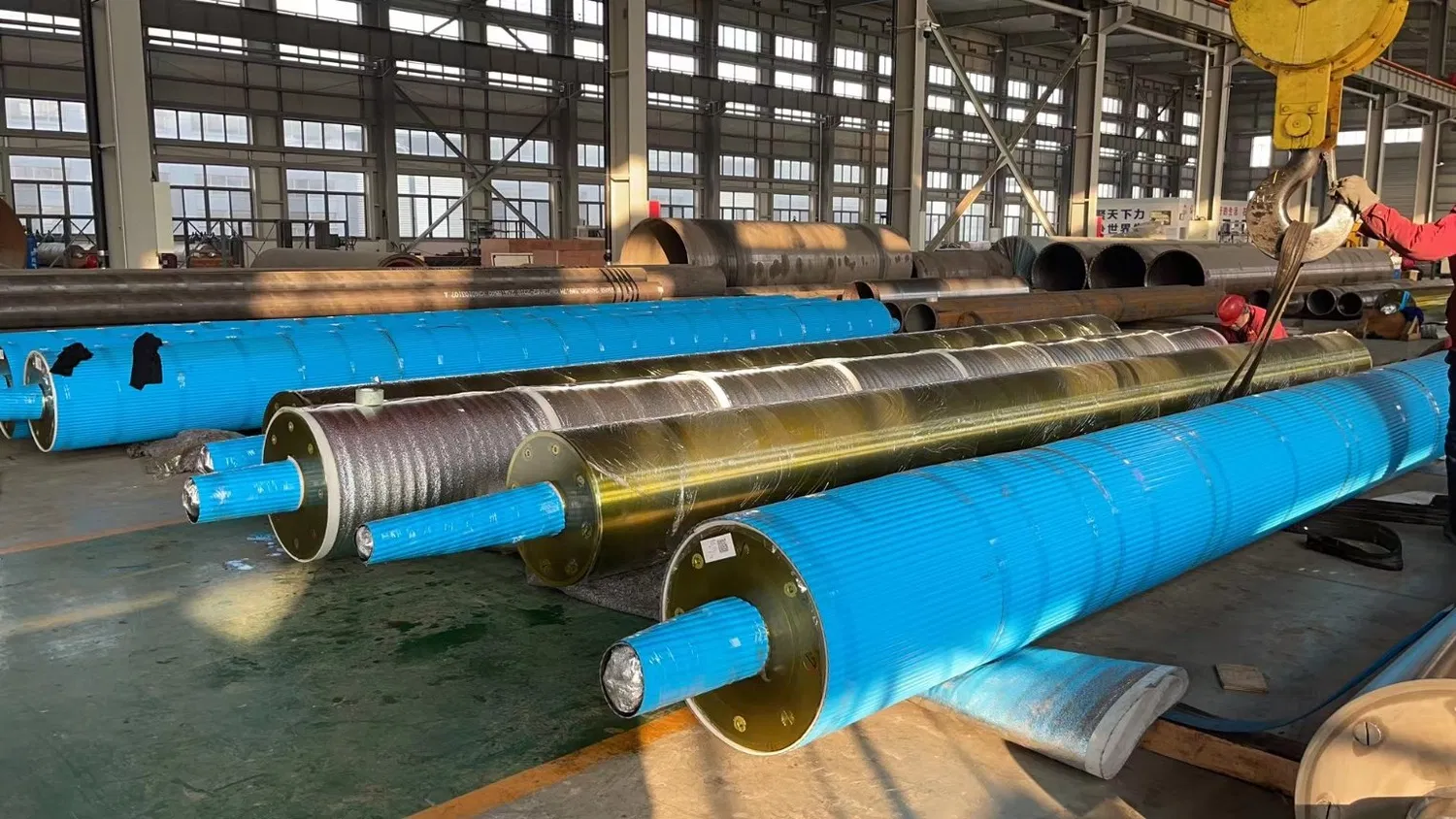In the intricate world of industrial manufacturing, where precision and efficiency are paramount, certain components act as the unsung heroes behind countless finished products. Among these, calender rolls stand out as indispensable workhorses, shaping everything from paper to plastic, textiles to rubber. But as any seasoned professional will tell you, the performance of these critical components hinges almost entirely on the expertise and reliability of your chosen Calender roll supplier. To be honest, finding the right partner in this specialized field isn't just about procurement; it's about securing a competitive edge.
Have you ever wondered about the smooth finish on your magazine pages, the consistent thickness of a plastic film, or the uniform texture of a non-woven fabric? Chances are, a calender roll played a pivotal role in achieving that quality. These massive, precisely engineered cylinders are at the heart of calendering processes, which involve passing materials through a series of heated and pressurized rolls to achieve desired thickness, smoothness, density, or surface characteristics. Frankly speaking, without high-quality calender rolls, many modern manufacturing processes would simply grind to a halt, or at best, produce substandard goods. This article will delve deep into the world of calender rolls and, more importantly, shed light on what makes a truly exceptional supplier in this vital industry.
The Unseen Backbone: Why Calender Rolls Matter Across Industries
Calender rolls are far more ubiquitous than one might initially imagine. Their applications span a vast array of industries, each demanding specific characteristics from the rolls to achieve optimal results. From the paper industry, where they ensure uniform thickness and surface smoothness, to the plastics sector, where they are crucial for producing films, sheets, and laminates, their impact is profound. In the rubber industry, they're used for sheeting, frictioning, and coating. Textiles benefit from calendering for gloss, density, and special finishes, while non-wovens rely on them for bonding and consolidation.
Interestingly enough, the function of a calender roll isn't just about pressing. It's about controlled deformation, heat transfer, and often, precise surface patterning. Consider a simple example: in the production of high-quality paper, calender rolls compress the paper fibers, reducing thickness and increasing smoothness and gloss. In plastic film extrusion, they cool and solidify the molten plastic into a consistent sheet. The variety of materials processed and the diverse range of desired outcomes necessitate an equally diverse range of calender roll types and specifications. This complexity underscores why partnering with a knowledgeable Calender roll supplier is non-negotiable.

What Makes a Superior Calender Roll Supplier Stand Out?
When you're dealing with components that are central to your production line's performance and product quality, the choice of your Calender roll supplier becomes a strategic decision. It's not merely about buying a product; it's about investing in a partnership that ensures reliability, innovation, and support. In my experience, the truly superior suppliers distinguish themselves through several key attributes:
Precision Engineering and Material Science Expertise
The core of a high-performing calender roll lies in its engineering precision. We're talking about tolerances measured in microns and surface finishes that can be mirror-like or specifically textured. A top-tier supplier possesses deep expertise in metallurgy and material science, understanding how different alloys (like chilled cast iron, forged steel, or specialized composite materials) behave under extreme pressure and temperature. They know which materials are best suited for specific applications, ensuring optimal hardness, wear resistance, and thermal stability. Furthermore, they're adept at applying advanced coatings, such as hard chrome, tungsten carbide, or various polymers, to enhance durability, release properties, and surface characteristics.
Customization Capabilities and Advanced Manufacturing Processes
One size rarely fits all in industrial manufacturing. A leading calender roll supplier offers extensive customization capabilities, working closely with clients to design and manufacture rolls tailored to their unique operational requirements. This involves everything from specific dimensions and weight to specialized internal cooling/heating channels and unique surface profiles. The manufacturing process itself is a testament to their capabilities. It typically involves meticulous steps like precision casting or forging, rough and finish machining, specialized heat treatments to achieve desired metallurgical properties, and critically, ultra-precision grinding and polishing. These grinding processes are performed on state-of-the-art machinery to achieve the exact dimensions, concentricity, and surface finish required for flawless operation. Dynamic balancing is another crucial step, ensuring that rolls operate smoothly at high speeds without vibration, which could otherwise compromise product quality and machine longevity.
Rigorous Quality Assurance and After-Sales Support
Quality isn't just a buzzword for a reputable supplier; it's ingrained in every stage of their process. They implement stringent quality control measures, from raw material inspection to non-destructive testing (NDT) of finished rolls, ensuring every product meets the highest standards and specifications. This commitment minimizes the risk of costly downtime and production errors for their clients. Beyond manufacturing, the best suppliers offer comprehensive after-sales support. This includes maintenance advice, expert repair services, regrinding capabilities to restore roll performance, and even emergency support. A long-term partnership with such a supplier means peace of mind, knowing that expert assistance is always at hand.
Navigating the Landscape of Calender Roll Types and Applications
The diversity of calender rolls is a direct reflection of the varied demands of the industries they serve. Understanding these types is key to making informed decisions, and a good Calender roll supplier will guide you through this complex landscape.
Hard Rolls vs. Soft Rolls
- Hard Rolls: Typically made from chilled cast iron or forged steel, these rolls are extremely durable and maintain their shape under immense pressure and high temperatures. They are ideal for applications requiring high compaction, density, and a very smooth, often glossy, finish. Common in paper, plastic film, and rubber calendering.
- Soft Rolls: Often composed of polymer composites, rubber, or specialized fibrous materials, these rolls offer a degree of compressibility. They are used when a softer touch is needed, perhaps to create a matte finish, to avoid damaging delicate materials, or to achieve specific textures. They are prevalent in textile finishing, non-woven bonding, and some specialized paper applications.
Heated and Chilled Rolls
Temperature control is a critical aspect of many calendering processes. Heated rolls, often using thermal oil, steam, or electrical resistance, are used to soften materials, promote bonding, or dry surfaces. Chilled rolls, conversely, are employed to rapidly cool materials, setting their shape and preventing deformation. The internal design of these rolls for efficient and uniform temperature distribution is a testament to advanced industrial roll manufacturing.
Specialty Rolls: Beyond the Basics
Beyond the standard hard and soft rolls, there's a world of specialty calender rolls designed for specific functions. These include:
- Embossing Rolls: Featuring engraved patterns on their surface to impart textures onto materials like paper, plastic, or leather.
- Laminating Rolls: Designed to bond multiple layers of material together under heat and pressure.
- Mirror-Finish Rolls: Polished to an extremely high degree of smoothness for applications requiring ultra-glossy surfaces.
- Matte Finish Rolls: Engineered with a specific surface roughness to create non-glossy, diffused finishes.
The ability to provide these highly specialized and precision calender rolls is a hallmark of a truly comprehensive supplier.
The Journey from Raw Material to High-Performance Roll: Manufacturing Insights
The creation of a high-quality calender roll is a fascinating blend of traditional metallurgy and cutting-edge engineering. It's a process that demands meticulous attention to detail at every stage, ensuring the final product meets the rigorous demands of industrial environments.
Material Selection and Initial Forming
It all begins with the right material. For hard rolls, high-grade cast iron or steel alloys are carefully selected for their specific metallurgical properties, such as carbon content, hardness, and wear resistance. These materials are then either cast into rough roll shapes or forged from large ingots. The casting process for chilled cast iron rolls is particularly specialized, involving rapid cooling of the outer layer to create a hard, wear-resistant "chill" layer.
Machining and Heat Treatment
Once the initial form is achieved, the rolls undergo a series of machining operations. This includes rough turning to remove excess material and bring the roll close to its final dimensions. For steel rolls, various heat treatments – such as annealing, normalizing, quenching, and tempering – are applied to relieve internal stresses, enhance strength, and achieve the desired hardness profile throughout the roll body. This is a critical step in ensuring the roll's long-term stability and performance.
Precision Grinding and Polishing
This is arguably the most critical stage for achieving the required precision and surface finish. Using highly specialized grinding machines, the rolls are ground to incredibly tight tolerances for diameter, concentricity, and parallelism. The surface is then meticulously polished, sometimes to a mirror finish, or textured as required. The quality of this step directly impacts the final product's quality, whether it's the smoothness of paper or the clarity of a plastic film. Many experts agree that this is where the true artistry of industrial roll manufacturing shines through.
Balancing and Final Inspection
Given that calender rolls often operate at high speeds, dynamic balancing is essential. This process ensures that the roll rotates smoothly without vibration, which could lead to uneven product quality or premature bearing wear. Finally, each roll undergoes a comprehensive final inspection, including dimensional checks, surface finish analysis, and often non-destructive testing (NDT) methods like ultrasonic testing or magnetic particle inspection, to detect any internal flaws. This rigorous process is what separates a good roll from a great one.

Choosing Your Strategic Partner: How to Select the Ideal Calender Roll Supplier
Given the significant investment and critical role of calender rolls in your operations, selecting the right supplier is a decision that demands careful consideration. It's not just about price; it's about value, reliability, and a long-term relationship. Here's what I've found to be crucial factors when evaluating potential partners:
Experience and Reputation
Look for a supplier with a proven track record. How long have they been in business? What do their existing clients say about them? A company with decades of experience in industrial roll manufacturing is likely to have encountered and solved a wide range of challenges, building a wealth of knowledge and expertise. Check for testimonials, case studies, and industry references.
Technical Expertise and R&D Capabilities
Does the supplier have a strong engineering team capable of understanding your specific needs and offering innovative solutions? Do they invest in research and development to stay ahead of industry trends and material advancements? A supplier that can offer custom calender roll solutions, rather than just off-the-shelf products, demonstrates a higher level of technical prowess. This is particularly important for unique applications or when you're looking to optimize existing processes.
Manufacturing Capabilities and Quality Control Systems
Visit their facility if possible, or at least request a detailed overview of their manufacturing processes and equipment. Do they use modern machinery for grinding, polishing, and balancing? What quality control certifications do they hold (e.g., ISO 9001)? A transparent and well-documented quality management system is a strong indicator of a reliable supplier.
Customer Service and Support
How responsive are they to inquiries? Do they offer comprehensive after-sales support, including maintenance, repair, and regrinding services? The true test of a supplier often comes when things go wrong. A partner who offers prompt, knowledgeable support can save you significant downtime and costs. Consider their ability to provide spare parts or emergency services.
Cost vs. Value Proposition
While price is always a factor, it should not be the sole determinant. A cheaper roll that fails prematurely or delivers inconsistent quality will cost you far more in the long run due to production losses, scrap material, and repair expenses. Focus on the total cost of ownership and the value proposition offered by the supplier, including their commitment to quality, longevity, and support.
Sustainability Practices
In today's world, a supplier's commitment to environmental responsibility is increasingly important. Do they have sustainable manufacturing practices? Do they offer options for refurbishing or recycling old rolls? Partnering with an eco-conscious supplier can align with your own company's sustainability goals.
Conclusion
The role of a reliable Calender roll supplier cannot be overstated in the success of industries reliant on precise material processing. From ensuring the smooth finish of paper to the consistent thickness of plastic films, these rolls are at the core of quality production. Choosing the right supplier means more than just acquiring a component; it means forging a strategic partnership with a company that offers unparalleled precision, material expertise, customization, and unwavering support. Investing in a top-tier supplier is an investment in your operational efficiency, product quality, and ultimately, your long-term profitability.
For more detailed information, please visit our official website:Calender roll supplier
About the author: Dr. Evelyn Reed is a materials science engineer with over 20 years of experience specializing in industrial roll manufacturing and surface engineering. Her work focuses on optimizing roll performance for various industries, including paper, plastics, and textiles. She frequently consults on advanced material selection and precision grinding techniques, making her an authority on the critical role of a quality calender roll supplier.


